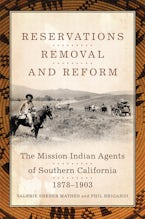LAW / Government / Federal
Showing results 1-4 of 4
Filter Results OPEN +

A Promise Kept
The Muscogee (Creek) Nation and McGirt v. Oklahoma
A Promise Kept explores the circumstances and implications of McGirt v. Oklahoma, likely the most significant Indian law case in well over 100 years. Combining legal analysis and historical context, this book gives an in-depth, accessible account of how the case unfolded and what it might mean for Oklahomans, the Muscogee (Creek) Nation, and other tribes throughout the United States.
Reservations, Removal, and Reform
The Mission Indian Agents of Southern California, 1878–1903
Providing a balanced, comprehensive view of the world these agents temporarily inhabited and the people they were called to serve, Reservations, Removal, and Reform deepens and broadens our understanding of the lives and history of the Indians of Southern California.
Diminishing the Bill of Rights
Barron v. Baltimore and the Foundations of American Liberty
In explaining how the Court came to reject a multisourced view of human liberties—a position seemingly inconsistent with its previous decisions—William Davenport Mercer helps explain why we now envision the Constitution as essential to guaranteeing our rights.
Claiming Tribal Identity
The Five Tribes and the Politics of Federal Acknowledgment
Who counts as an American Indian? Which groups qualify as Indian tribes? These questions have become increasingly complex in the past several decades, and federal legislation and the rise of tribal-owned casinos have raised the stakes in the ongoing debate. In this study, Mark Edwin Miller describes how and why dozens of previously unrecognized tribal groups in the southeastern states have sought, and sometimes won, recognition, often to the dismay of the Five Tribes—the Cherokees, Chickasaws, Choctaws, Creeks, and Seminoles.

A Promise Kept
The Muscogee (Creek) Nation and McGirt v. Oklahoma
A Promise Kept explores the circumstances and implications of McGirt v. Oklahoma, likely the most significant Indian law case in well over 100 years. Combining legal analysis and historical context, this book gives an in-depth, accessible account of how the case unfolded and what it might mean for Oklahomans, the Muscogee (Creek) Nation, and other tribes throughout the United States.
Reservations, Removal, and Reform
The Mission Indian Agents of Southern California, 1878–1903
Providing a balanced, comprehensive view of the world these agents temporarily inhabited and the people they were called to serve, Reservations, Removal, and Reform deepens and broadens our understanding of the lives and history of the Indians of Southern California.
Diminishing the Bill of Rights
Barron v. Baltimore and the Foundations of American Liberty
In explaining how the Court came to reject a multisourced view of human liberties—a position seemingly inconsistent with its previous decisions—William Davenport Mercer helps explain why we now envision the Constitution as essential to guaranteeing our rights.
Claiming Tribal Identity
The Five Tribes and the Politics of Federal Acknowledgment
Who counts as an American Indian? Which groups qualify as Indian tribes? These questions have become increasingly complex in the past several decades, and federal legislation and the rise of tribal-owned casinos have raised the stakes in the ongoing debate. In this study, Mark Edwin Miller describes how and why dozens of previously unrecognized tribal groups in the southeastern states have sought, and sometimes won, recognition, often to the dismay of the Five Tribes—the Cherokees, Chickasaws, Choctaws, Creeks, and Seminoles.





